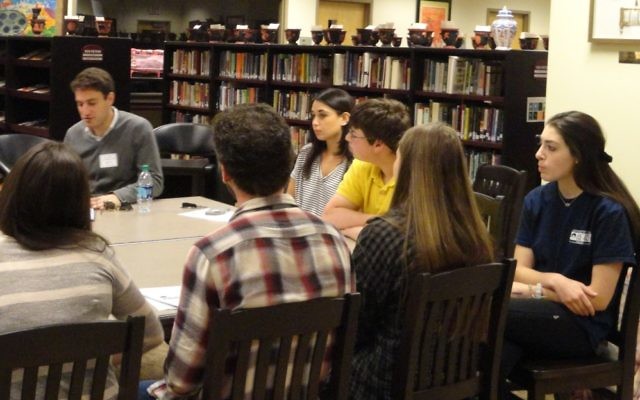Hard Truth on Campus: No End to Anti-Semitism
By Sarah Moosazadeh sarah@atljewishtimes.com
“There is no better time to be a Jew,” Jacob Levkowicz told parents and students during a discussion about “Unpacking Anti-Semitism on Campus” at the Weber School on Sunday, March 20.
As part of an initiative to raise awareness about anti-Semitism on college campuses, American Jewish Committee and community partners such as BBYO and Hillels of Georgia held the dialogue, revolving around three points: the community’s overall concern about people in conflict zones; the complications involved in being pro-Israel; and the vast amount of misinformation projected within the media.
Joining Levkowicz, AJC’s first assistant director of campus affairs, as a speaker was Ken Stein, who teaches political science, Middle Eastern history and Israeli studies at Emory University and leads its Institute for the Study of Modern Israel.
Before holding breakout sessions, Levkowicz outlined the evening by highlighting three key issues that foster anti-Semitism at colleges: boycott, divestment and sanctions resolutions presented within student governments; student leaders who are gradually drifting away from Jewish organizations; and the steady decline of millennials’ commitment to Israel.
Joining that unholy trinity to make Jewish students more susceptible to anti-Semitism than ever are the disruption of pro-Israel events on campus and academic associations that are adopting boycott resolutions.
But where there is a will, there is a way, and thanks to resources such as AJC, Jewish students also have never been better equipped to face such challenges.
For the breakout sessions, the audience was divided into the students, who accompanied Levkowicz to the library, and the parents, who remained with Stein.
Levkowicz wasted no time in getting the conversation started. He asked the students to relay some of the daily challenges they face as Jews. Their answers included the choice between personal identity and social issues and an overall frustration with the media’s portrayal of Israel.
Others were more concerned about speaking against professors who challenge their beliefs and the common misconceptions outsiders have about the Palestinian-Israeli dispute.

Levkowicz asked the students to close their eyes and think of Israel for 20 seconds. After reopening their eyes, they were each asked to define Israel in one word. Common responses included “protected,” “home,” “family,” “engaged,” “controversial,” “culture,” “diverse,” “community” and “misunderstood.”
Levkowicz then asked the students to perform the same task for the word “Jewish.” Terms such as “patriotic,” “connections,” “supported” and “family values” emerged.
The students concluded that whatever their beliefs, there will always be narratives that conflict with their ideology. Whether through stereotypes, reconsideration of support for Israel, or the BDS movement’s connection to college campuses, anti-Semitism will remain an obstacle.
Abby Schwartz, who is a senior at the Galloway School, said it is important to discuss controversial topics such as Israel. She views dialogue as a way to help students disagree with their peers in a constructive way.
After the breakout session, Levkowicz reunited the students with their parents and re-emphasized AJC’s role as a resource for Jewish students. He encouraged them to keep building coalitions with various organizations and held them accountable as the next wave of Jewish leaders who will combat anti-Semitism.
Photos by Sarah Moosazadeh





comments